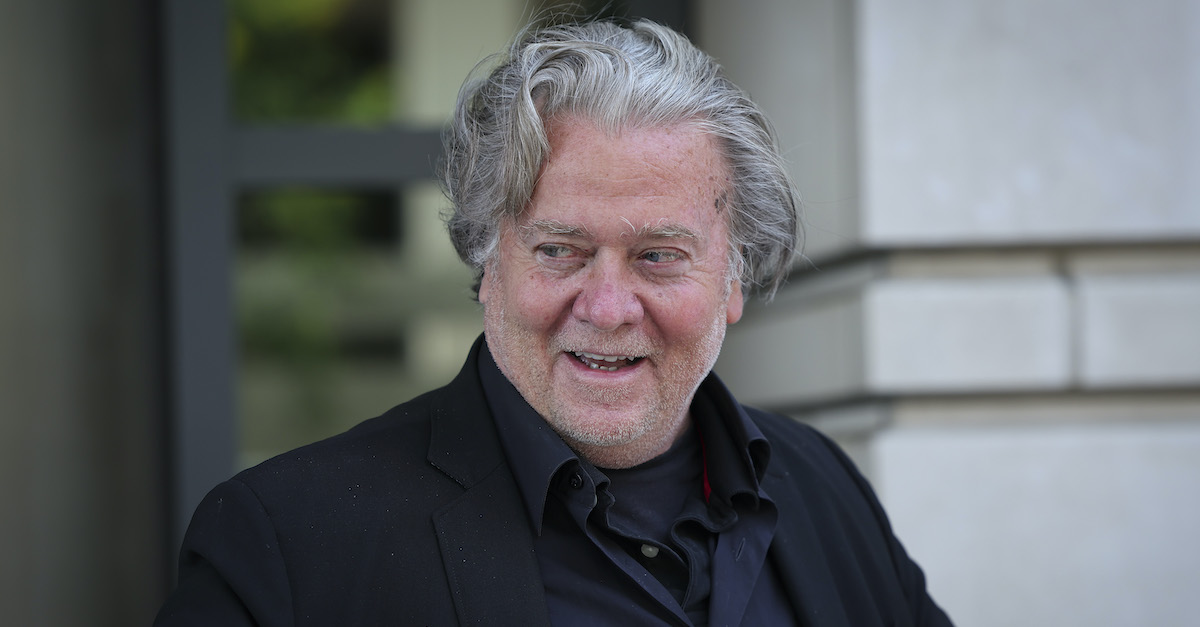
WASHINGTON, DC – JUNE 15: Steve Bannon, advisor to former President Donald Trump, departs the E. Barrett Prettyman U.S. Courthouse on June 15, 2022 in Washington, DC.
Steve Bannon asked a federal judge on Friday to forbid prosecutors from invoking the Jan. 6 attack on the U.S. Capitol as irrelevant and “prejudicial” in his upcoming trial on contempt of Congress charges.
“Evidence about events that took place eight months earlier—namely the Jan. 6, 2021, attack on the U.S. Capitol – have no bearing on whether Mr. Bannon willfully made default in response to the Sept. 23, 2021, subpoena,” Bannon’s lawyers wrote in a 3-page motion. “Thus, any evidence or argument regarding those events should be precluded. Even were one to assume that any evidence about January 6, 2021, was relevant—and it is not—the evidence and argument must nonetheless be excluded under Rule 403.”
Under the Federal Rules of Evidence, Rule 403 allows for the exclusion of evidence that is prejudicial or causes confusion.
“Its probative value would be far outweighed by its prejudicial effect,” the motion continues. “This is especially true given that trial will take place in Washington, DC, where the U.S. Capitol is located, and because images and commentary about the attack, and the subsequent actions of the Select Committee, have saturated the local (and national) media.”
“Incendiary and Baseless Political Attacks”
Earlier this week, U.S. District Judge Carl Nichols, a Donald Trump appointee, rejected Bannon’s attempt to dismiss his indictment on two counts of contempt of Congress.
On Friday, Bannon and prosecutors jockeyed to set the parameters for what evidence the jury may consider. Bannon’s lawyers M. Evan Corcoran, David I. Schoen and Robert Costello also hoped to keep the prosecution’s “speaking indictment” away from the jury, arguing that it contained information that wasn’t pertinent for trial.
Shortly after Bannon’s legal team made those requests, federal prosecutors filed a 17-page motion of their own broadly arguing that Bannon should not be allowed to turn the trial into a political “spectacle.”
“The question for the jury in this trial is a straightforward one: whether the Defendant, Stephen K. Bannon, deliberately refused to comply with a subpoena issued to him by the Select Committee to Investigate the January 6th Attack on the United States Capitol,” Assistant U.S. Attorney Amanda R. Vaughn wrote.
Bannon faces two counts of contempt of Congress, one for withholding testimony and other for failing to provide documents to the Jan. 6 Committee.
“But in his filings, at oral argument, and during press conferences in front of the courthouse, the Defendant has repeatedly sought to inject into this case improper evidence and argument, make incendiary and baseless political attacks, and create a spectacle,” the government’s filing states. “To maintain proper order and keep the jury focused on its fact-finding duty, the Court should exclude any such improper evidence and argument at trial.”
“Misdemeanor from Hell”
Prosecutors want to keep Bannon and his lawyers from wading into “incendiary and irrelevant” topics, as they say he promised from his first press conference outside the courthouse.
“I’m telling you right now, this is going to be the misdemeanor from Hell,” Bannon boasted to reporters at the time, vowing to go on the “offense.”
The government argues Bannon shouldn’t be able to “politicize” the case, calling the composition of the Jan. 6 Committee “irrelevant” to the issues at trial.
“The House is not a party to this case and, indeed, is a separate branch of government from the prosecution team,” the motion stated.
Prosecutors also want to bar Bannon from calling Congress members or their staff to question them about their biases on the witness stand.
“Finally, it would likewise be improper for the Defendant to call Members or staff for the sole purpose of questioning them about their biases against the Defendant,” prosecutors continued.
According to prosecutors, Bannon also should not be able to attack the legitimacy of the Jan. 6 Committee on statutory or constitutional grounds—or argue that executive privilege excused him from complying with the subpoena. Some materials sought by the Committee extended far beyond the scope of any work for former President Trump, they noted.
“For example, it sought records relating to the Defendant’s communications with various militia groups, such as the Proud Boys and the Oath Keepers; records relating to the Defendant’s meetings with Members of Congress; records relating to the Defendant’s efforts to help people travel to Washington, D.C., for the January 6th rally; and records relating to the Defendant’s podcast,” the motion said.
Bannon will be tried next month on July 18.
Read the motions here:
(Photo by Win McNamee/Getty Images)